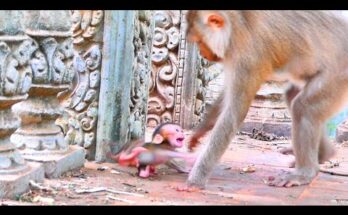For a baby monkey, nursing is more than just feeding—it is comfort, warmth, and the foundation of its bond with its mother. But sometimes, a mother monkey may begin to refuse her baby’s attempts to nurse. This often happens when the mother feels tired, stressed, or when the baby is old enough to start learning independence. For the baby, however, this rejection can be confusing and upsetting.
The little monkey, still clinging tightly to its mother, tries again and again to latch on. Each time, the mother pushes it away or shifts her body to block access. The baby squeals in frustration, its tiny face filled with sadness. It does not understand why the milk it has always relied on is suddenly denied. What the mother sees as part of natural growth, the baby feels as rejection.
The unhappiness of the baby is easy to notice. It may cry, pull at its mother’s fur, or even throw itself onto the ground in protest. Yet despite the tears, the mother holds firm. Her actions, though harsh in appearance, are part of teaching the young one to adapt, to explore other food sources, and to begin life beyond constant nursing.
Still, the moment is deeply emotional. The baby’s unhappiness reminds us of how hard it is to let go of comfort and security. It also shows that, even in the animal world, growing up is not always easy. The rejection is not a lack of love but a mother’s instinctive way of guiding her child toward independence.
This small drama between mother and baby reflects a universal truth: the path to maturity often begins with tears, yet it is guided by love and necessity.

